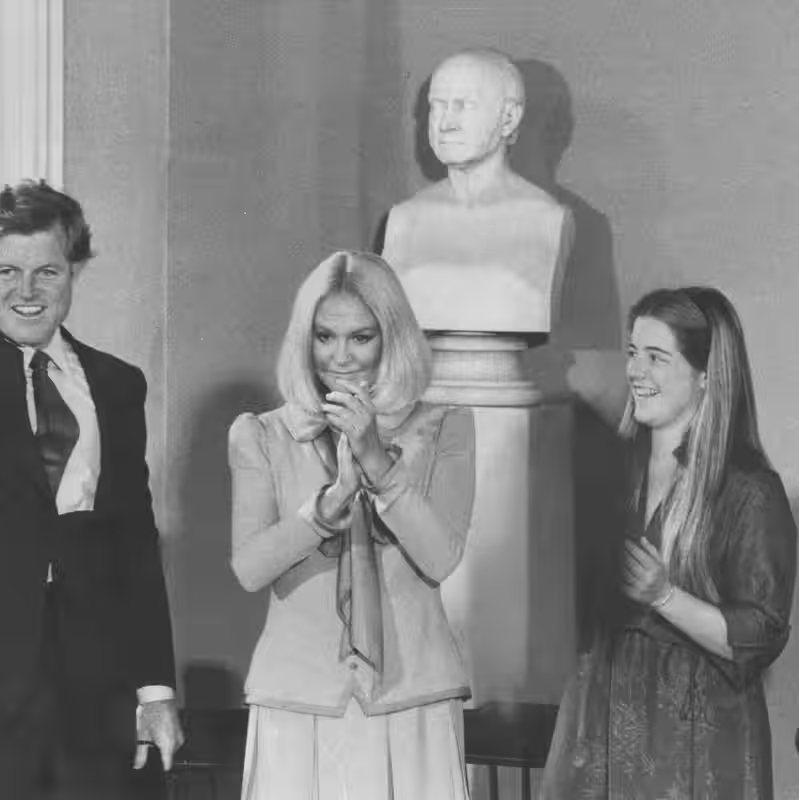Joan Kennedy, the former wife of Senator Edward “Ted” Kennedy and a resilient figure within America’s most storied political family, has died at age 89. Her life—marked by glamour, personal struggle, and quiet strength—offers a window into the human cost of living inside a dynasty that never left the public eye.
Table of Contents
- Who Was Joan Kennedy?
- Her Marriage to Ted Kennedy
- Life in the Kennedy Spotlight
- Personal Struggles and Public Perception
- Joan Kennedy’s Enduring Legacy
- Sources
Who Was Joan Kennedy?
Born Joan Bennett in 1936 in New York City, she grew up far from the corridors of power—her father was a Wall Street lawyer, her mother a homemaker. She studied music at Manhattanville College and dreamed of a career as a classical pianist. But her life changed forever in 1957 when she met a young, charismatic Harvard graduate named Ted Kennedy at a party in Greenwich Village.
Their whirlwind romance led to marriage in 1958. Overnight, Joan became part of the Kennedy dynasty—a family already mythologized by the presidency of John F. Kennedy and the political rise of Robert F. Kennedy.
Her Marriage to Ted Kennedy
For 25 years, Joan Kennedy stood beside Ted as he built one of the most influential Senate careers in U.S. history. She gave birth to three children—Kara, Edward Jr., and Patrick—and often played the role of dutiful political spouse during campaigns and public appearances.
But behind the polished photo ops lay turbulence. Ted’s infidelities were an open secret in Washington. The couple separated in 1978 and divorced in 1982, though Joan remained a fixture at major family events, including funerals and milestone birthdays.
Life in the Kennedy Spotlight
Unlike Jackie Kennedy, whose elegance became iconic, or Ethel Kennedy, known for her activist fire, Joan was often misunderstood. The press painted her as aloof or fragile—especially during periods when she battled alcoholism and depression, illnesses rarely discussed openly in the 1960s and ’70s.
Yet those who knew her described a woman of deep intelligence, artistic sensitivity, and unwavering loyalty to her children. “She never sought fame,” said a longtime family friend. “She just got swept into a current she didn’t create—but she never drowned.”
Personal Struggles and Public Perception
| Year | Milestone | Public Reaction |
|---|---|---|
| 1958 | Marries Ted Kennedy | Celebrated as “the next Kennedy bride” |
| 1969 | Chappaquiddick incident | Joan stood by Ted amid national outrage |
| 1978 | Separation announced | Media speculated on her mental health |
| 1983 | Published memoir “Times to Remember” | Praised for honesty, criticized by Kennedy loyalists |
In her 1983 memoir, Joan wrote candidly about the loneliness of political marriage and the pressure of living up to the Kennedy name. “I wasn’t born into this world,” she wrote. “I married into it—and it never fully accepted me.”
Joan Kennedy’s Enduring Legacy
Though she stepped back from public life in later decades, Joan remained a devoted grandmother and quietly supported mental health and addiction recovery causes. Her children—especially Patrick, who served in Congress and founded a mental health advocacy group—have credited her resilience as a guiding force.
Her death marks the closing of a complex chapter in American political history: not just the story of a senator’s wife, but of a woman who navigated fame, family tragedy, and personal healing with quiet dignity.




